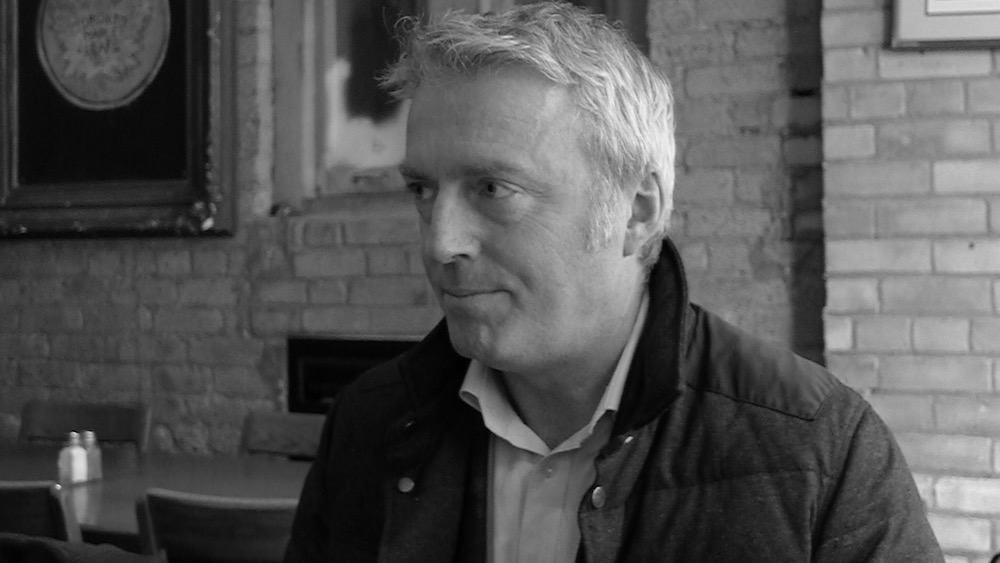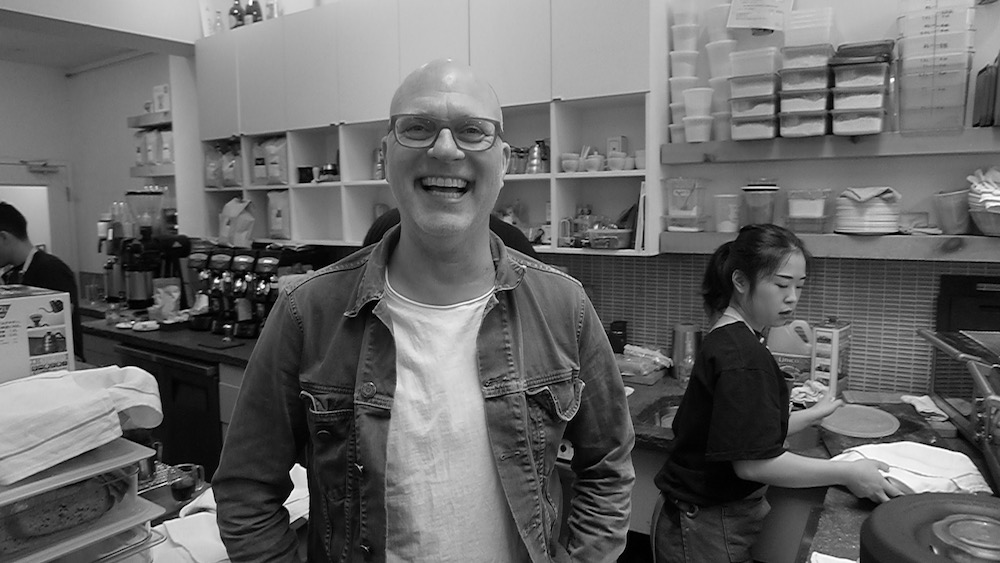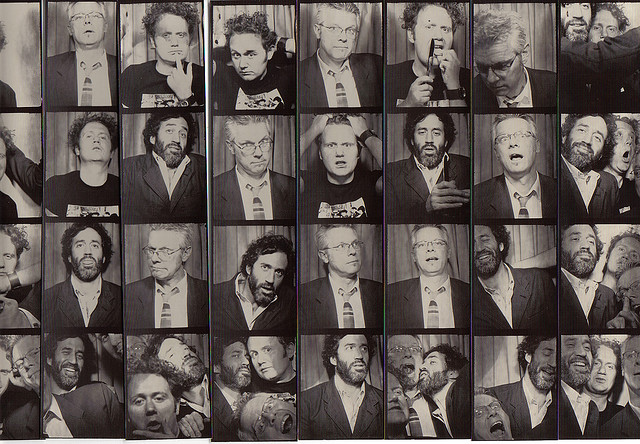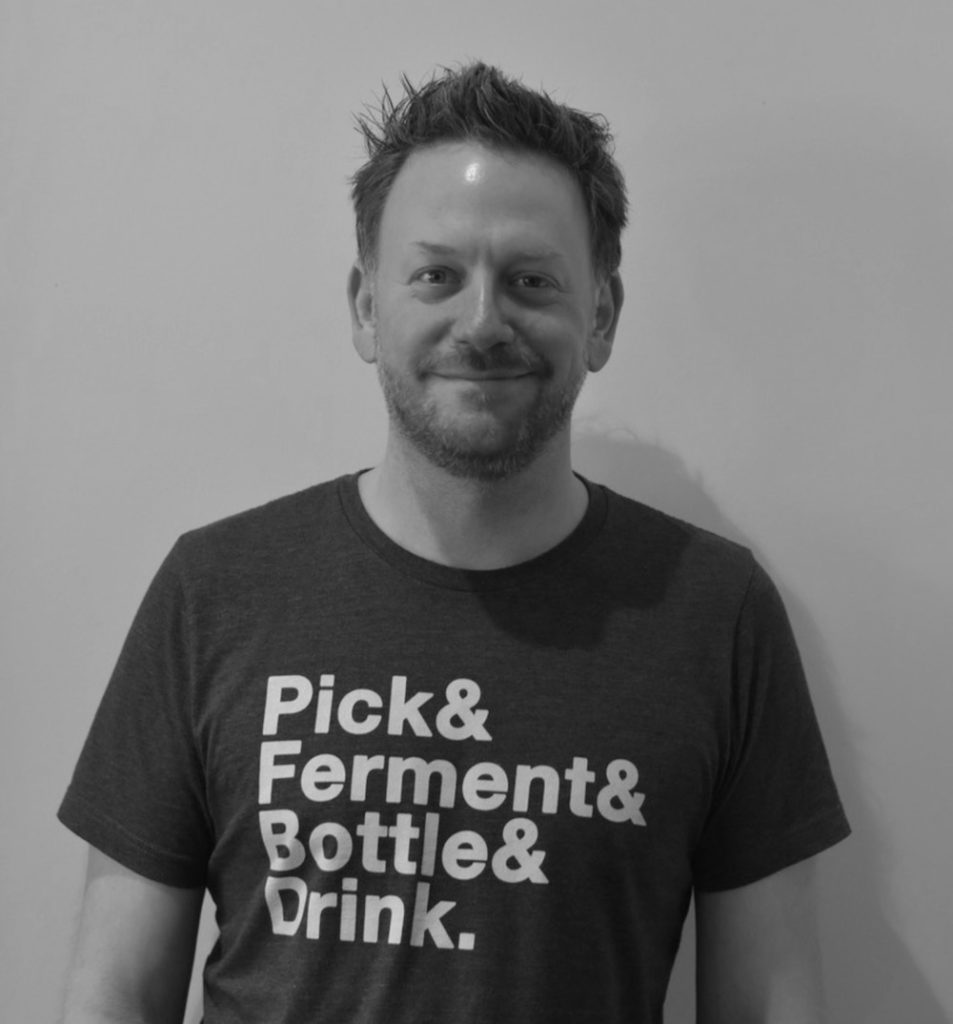
Old Bastard (Le) Sommelier, Bernard Stramwasser in a slightly jocular wine-themed t-shirt.
In a spin-off from our extremely popular Young Blood Sommeliers series, we are proud to present The Old Bastard Sommeliers, who will be running in alternating episodes to our ongoing YBS interviews, well, that is if these Young Bloods can get their acts together to complete the interviews.
This sure-to-be-entertaining series will focus upon in-depth extended interviews with some of the more infamous veteran characters in the scene, examining where they got their first start, who inspired them, how (through their skills, eccentricities, and perversions) they developed into the legendary figures they are today, and what tips and tricks they would pass on to the young bucks who are occasionally making them feel like relics of a bygone age.
This time around we speak with a fellow who was actually a Young Blood Sommelier when we first asked him about taking part some eight years ago; in the interim years he has aged gracefully into the gloriously old bastard he is today.
Ladies and gentlemen, I present for your delectation, Mr. Bernard Stramwasser of Le Sommelier Wine Agency.
Good Food Revolution: So Bernard, what is it that you are doing these days?
Bernard Stramwasser: Well, we’ve worked on quite a few things over the last little while, prompted by the pandemic. With the arrival of Mixed Cases into Ontario, we’ve been very busy making dozens of rotating cases, which have been a big success. It’s been great to finally offer our private customers the chance to try a wide selection of our portfolio, without committing to a whole case of a single wine. It’s been a lot of fun, and a great opportunity. We’ve been bringing in a whole bunch of new wines to satisfy this new channel. We’ve also started importing foodstuffs for our new Provisions portfolio, bringing in some complementary products from wine producers we already work with. Tenuta Fanti, from Montalcino, was our first Provisions supplier, with a range of their premium olive oils. We’ve just received their 2021 harvest of oils.
GFR: When did you first decide that you would like a career in wine?… and was it with a view to becoming a Sommelier? Or was it the agency side of things that attracted you?
BS: I’ve always wanted to have my own business. When I visited the Alsace in December 1999, I met with a producer, JM Sohler. In speaking with Hervé Sohler, and hearing the challenges he, as a very small producer, faced with exporting their product (he barely even had his wines in Paris), I realized importing is something I wanted to try. I had considered distribution over my years of travel, and the new idea of importing and distributing wine really sparked. I gratefully speak a number of languages, which makes connecting with producers across Europe much easier. After I created the agency in 2000, I quickly realized I needed to obtain the sommelier certification, since my company was named Le Sommelier.
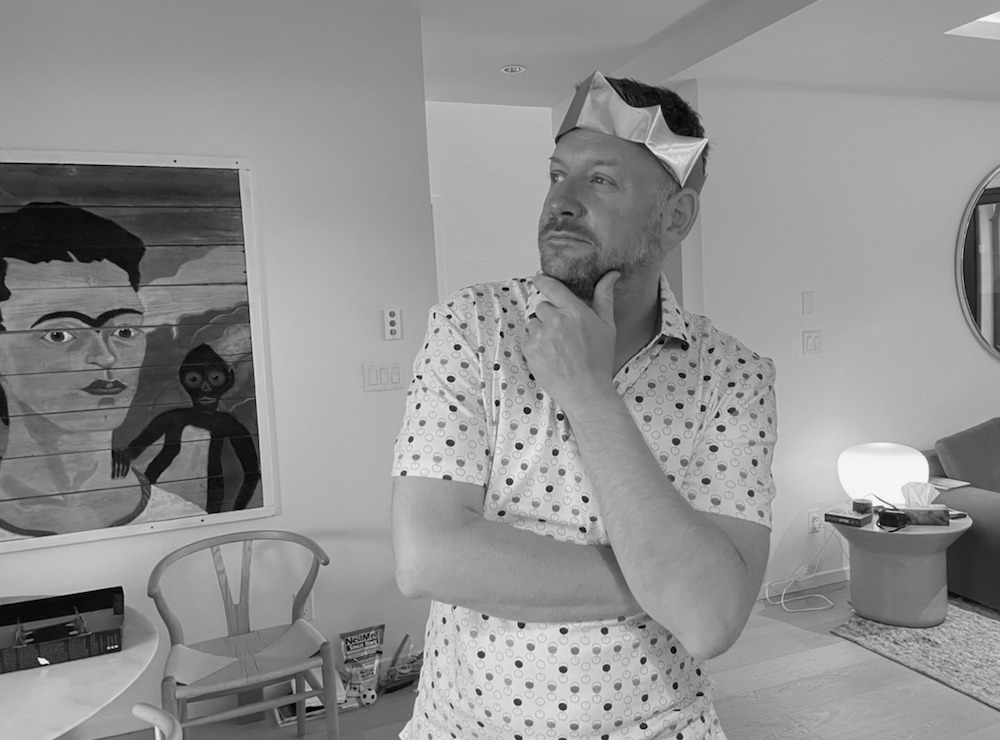
Old Bastard (Le) Sommelier, Bernard Stramwasser, looking pensive and yet festive simultaneously.
GFR: What’s the story behind your formal wine education? And with considerable hindsight do you feel that this was the best route to where you are today?
BS: My formal education was completed in 2006 after 2.5 years studying with the International Sommelier Guild. However, my informal wine education started at a very young age, having the opportunity to live in France, and travel to various wine regions with my family. That really helped set the stage.
GFR: Have you ever been in a wine biz situation and begun to really feel your (relative) age? And if so, why?
BS: No, I have always been, and always will be, young at heart.
GFR: Along the way, who inspired you the most? Did you have any mentors? And what did they do that set them apart from everyone else?
BS: Truth is, I started my wine business knowing nothing about wine business, and knowing no one in the industry in Toronto or around the world. I really knew no one. I worked at Mövenpick as a bartender in the mid 1990s, and Phillip Rose introduced me to the concept of a sommelier, and taking wine as a subject towards a career path.
GFR: So what makes for a good agent/supplier/merchant in your mind?
BS: Given that wine is one of those fascinating products that is constantly changing, it’s important to stay relevant in the wine world. The wines we started bringing in 20 years ago are not the same wines that carry the same level of interest today. Wine tastes change. A good merchant needs to be aware of what’s happening around the world, not just in their own bubble. A great merchant needs to taste and understand the wines, and regions, in their portfolio.
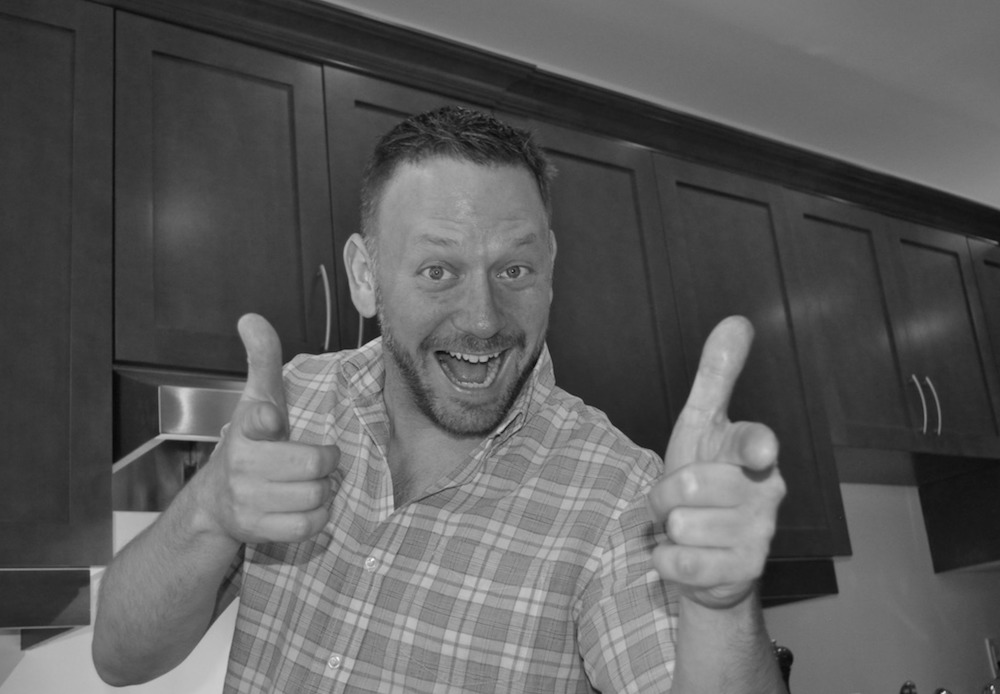
Old Bastard (Le) Sommelier, Bernard Stramwasser.
GFR: How do you feel that the industry has changed since you first started all those years ago?
BS: 22 years is a long, and short time. Natural wines were not on anyone’s radar when we started importing in the early 2000s. Bonterra was one of the only organic wines on the shelves at the LCBO. I remember having to explain what organic wine was to people. That’s not a conversation of the past few years.
GFR: And how has Toronto changed as a wine city?
BS: Back when I first started the company, when we first met at Jamie Kennedy Wine Bar, that place was unique. You guys were bringing in wines people hadn’t tasted before. There weren’t many wine bars in the city. And the wine was really selected around the food. Today wine bars seem to stand more alone, without tying the wines to the food.
GFR: And where do you feel does a good job wine-wise these days? And what makes them stand out from the crowd?
BS: I think Archive Wine Bar does a great job. Midfield, Paris Paris, Paradise Theatre, Grape Crush… There are so many in my ‘hood alone, it’s impossible to shortlist now. New great places are always popping up.
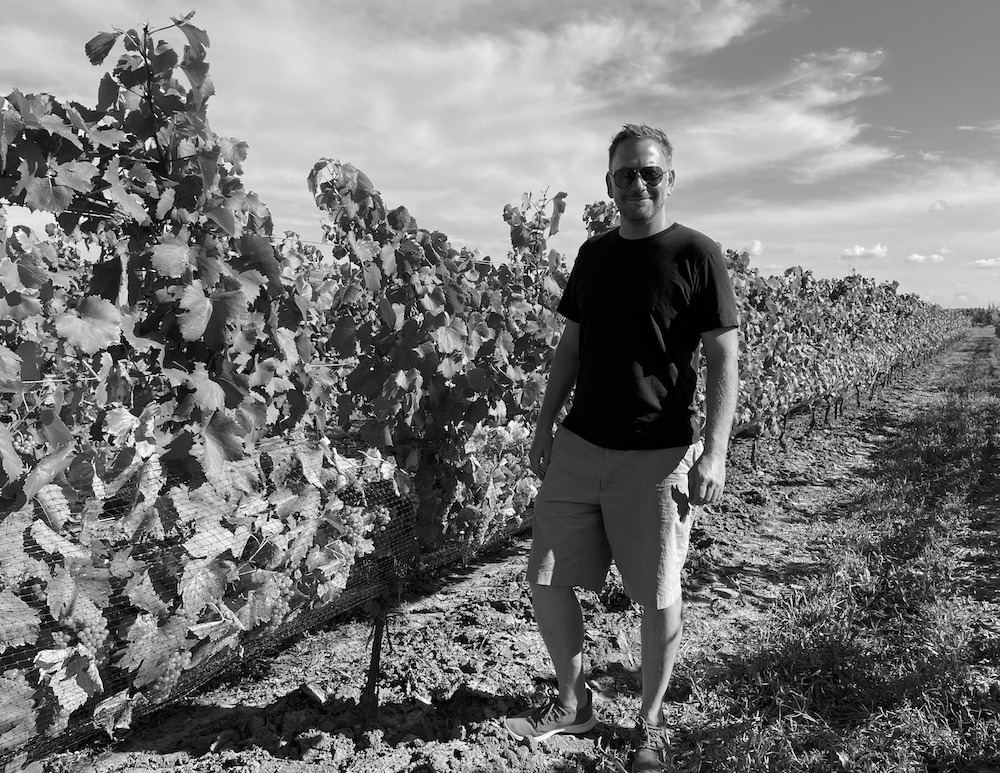
Old Bastard Sommelier, Bernard Stramwasser of Le Sommelier.
GFR: The fact that anyone with a licence can now open a bottle shop has changed the booze retail landscape forever, and it’s maybe one of the few good things to come out of the pandemic.
How have you witnessed this new found freedom evolving over the past two years? How do you feel about mark-ups and the like? And who is doing THAT well?
BS: The emergence of bottle shops has most certainly been a saving grace for the restaurant industry, and allowed licensees to get creative with their offerings. Of course there was an adjustment period with pricing, but that seems to have shaken out. Wine savvy customers are aware of pricing. Now that restaurants are open again, operators can offer wines to be enjoyed on site, or taken to go.
In Europe, when you buy a coffee, you will pay different prices depending on whether you stand at the bar, or sit down at a table, and possibly another if you take it to go (although one would rarely take an espresso to go!) The point here is that bottles shops have had to be creative with their pricing, depending on where their customers consume the bottles.
There are many great bottle shops in Toronto, too many to list here. You can find an incomplete but constantly growing list of shops on https://www.bottleshopto.com/shops.
GFR: How do you feel about Canadian wines? And how have you viewed their evolution since your early days in the industry?
BS: I’ve enjoyed watching the Canadian wine industry evolve over the past two decades. The first Canadian winery I bought from was Peninsula Ridge, when Jean-Paul Colas moved from Domaine Laroche in Chablis to Ontario. I opened up their 2004 Sauvignon Blanc last year, and it was excellent. Over the years there have been wineries like Hidden Bench that have shown the importance of specific sites, especially with Chardonnay and Pinot Noir. Ontario Chardonnay is being made on a world scale. I’m impressed with what folks like Thomas Bachelder are doing now with Gamay.
GFR: And what do you feel we should really give up on?
BS: Big reds. Cabernet Sauvignon and Merlot based wines are really challenging. We face a difficultly marketing our wines. Ontario consumers prefer to drink red wine 3x more than white wine, though we excel at white wines, like Chardonnay and Riesling in particular.
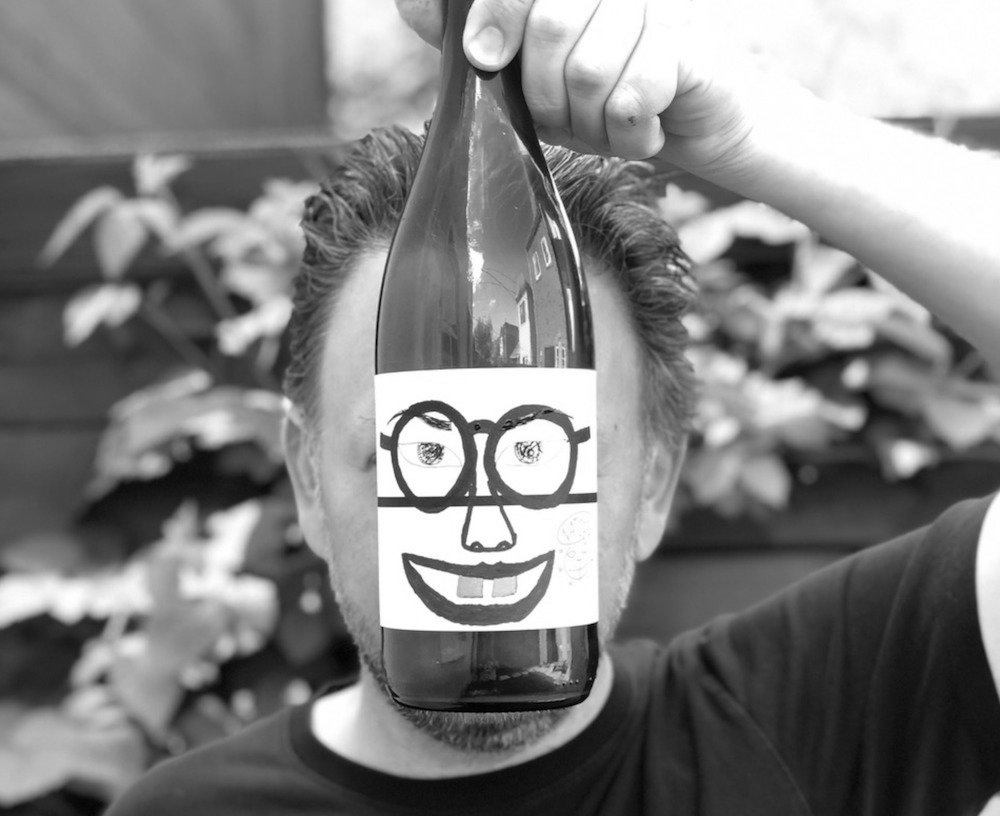
Old Bastard (Le) Sommelier, Bernard Stramwasser, pictured here with an amusing bottle
GFR: Can you remember your first taste of wine?
BS: I tasted Champagne in the region around age 10, but it was an experience in Sancerre, in my late teens, tasting with my family in a barrel cellar, and getting a draw from a pipette, which really struck me.
GFR: When do you feel children should be introduced to the wonderful world of wine?
BS: I’ve always included my two kids in my wine life, having them smell wines, and letting them dip a finger in my glass to taste. Recently my son enjoyed a sip of Chassagne-Montrachet. I was happy his palate was tuned into such a great wine. I think it’s best to normalize wine from a very early age, as a normal part of life.
GFR: One of the greatest perks of our industry is the opportunity to travel. Which wine regions have you had the opportunity to visit? I know this is going to be a hell of a long list…
BS: I have been fortunate to visit many wine regions across Europe, yet I feel there is still so much to see. I haven’t been to Sicily, Sardinia, Savoie, Santorini – there are still so many places to experience. Although I’m half Chilean, I haven’t visited the wine regions there yet. I’m hoping to get South Africa for the first time this year…
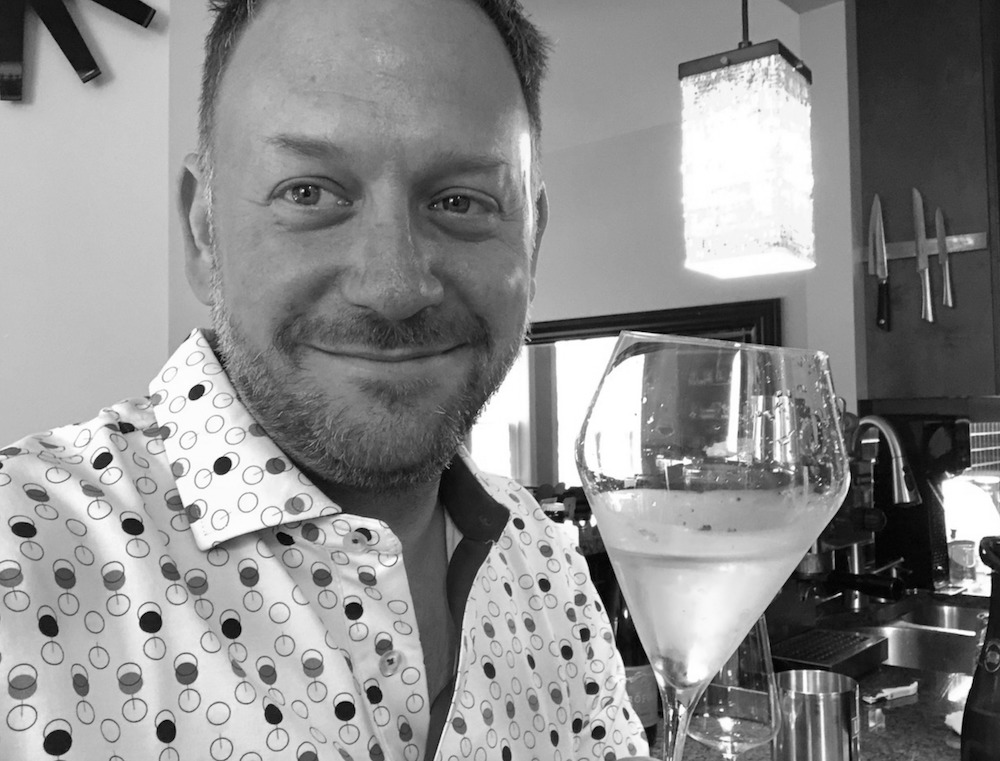
Old Bastard (Le) Sommelier, Bernard Stramwasser, pictured here getting his wine on.
GFR: Have you ever made your own wine?
BS: No, not yet, but it is something I’d like to try.
GFR: And where would you like to make wine (in a pipe dream)?
BS: Given my love for Chardonnay, and home in Ontario, I would be remiss to not look at giving Ontario Chardonnay a go.
GFR: Who is, in your mind, a real role model for Old Bastard Sommeliers?
BS: There is only one person that comes to mind: Peter Boyd. I was fortunate to taste with Peter very early on in my wine sales career in the early 2000s, when he was buying for Scaramouche. Peter is a true gentleman, always taking wine tasting very seriously, taking notes and asking intelligent questions. He always approaches wine in a methodical and thoughtful way.
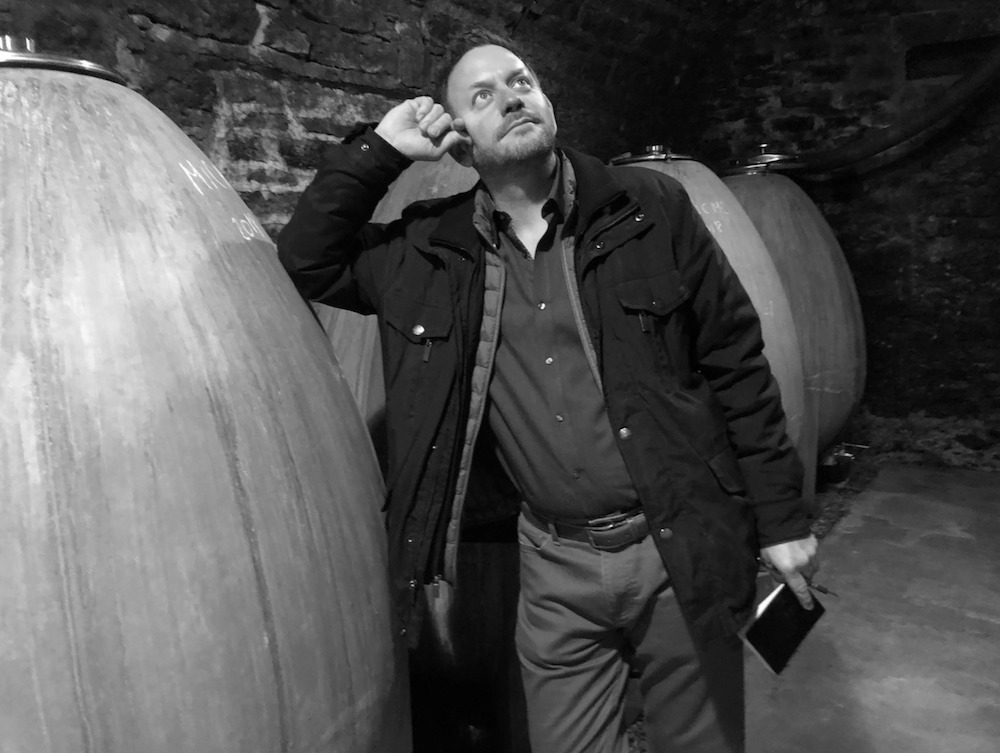
Old Bastard Sommelier, Bernard Stramwasser of Le Sommelier.
GFR: Wine industry folks famously have their weekends off… What’s your idea of a perfect weekend?
BS: My best weekends consist of shopping for fresh foodstuffs and making meals at home with the people I love.
GFR: When are you inviting me around?
Where are your favourite places to dine and drink in Toronto?
BS: My favourite place is the bar at Bar Isabel. Their food is consistently amazing, the vibe is awesome, the service impeccable… From day 1 since they opened, I have felt at home. They have an amazing ability to hire a team that knows how to sincerely engage with their customers. And it’s easy walking distance to my home.
GFR: Do you cook yourself? What’s your favourite dish to cook these days?
BS: Very much. My favourite dish to make at the moment is Bouillabaisse. Pairs with rosé champagne.
GFR: Again, when do I get the invite?
Do you feel that there is a good Sommelier community in Toronto? And how was it when you started in the business?
BS: Yup – I think there is a really good community in Toronto. It continues to grow.
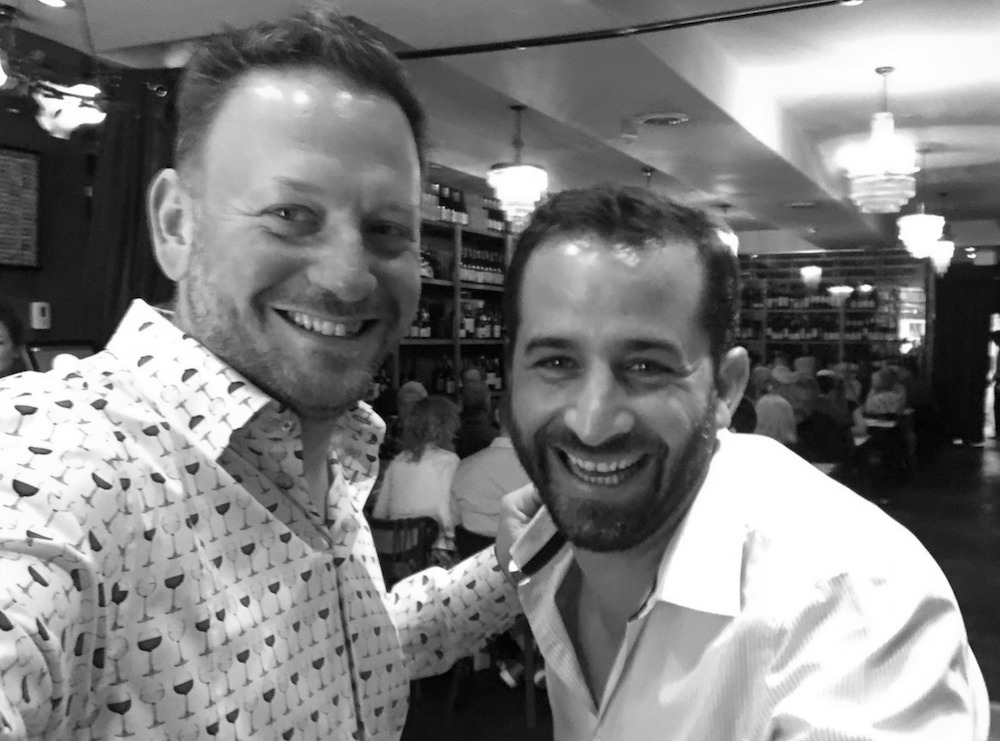
Old Bastard (Le) Sommelier, Bernard Stramwasser, and the one-and-only Antonio Maçanita of Fita Preta.
GFR: I’ve heard so many of my peers say that they don’t do the big shows anymore, the big wine tastings. What are your thoughts on that? I guess that you are obliged to be at a lot of those now?
BS: I’ve just booked trips to ProWein, VieVinum, VinItaly for this year. For us, the international shows are an important place to connect with producers. Regarding the local shows, like California Wine Fair, we typically prefer to take our producers around to visit licensees instead of participating in trade shows.
GFR: What would you be doing if you were not doing what you are doing today?
BS: Hm. My life in wine is so incredibly gratifying, I can’t imagine doing anything else.
GFR: What are your thoughts on blind tasting wine?
BS: I think it’s very important, to keep you humble. I do this with my team weekly. It’s important to look at a wine in the glass without judgment.
GFR: What’s your current favourite wine region?
BS: Champagne.
GFR: When it comes to wine is there anything that you feel is, or always has been, overrated?
BS: Riesling. *ducking*
GFR: What is your weapon of choice when it comes to a corkscrew?
BS: Code 38
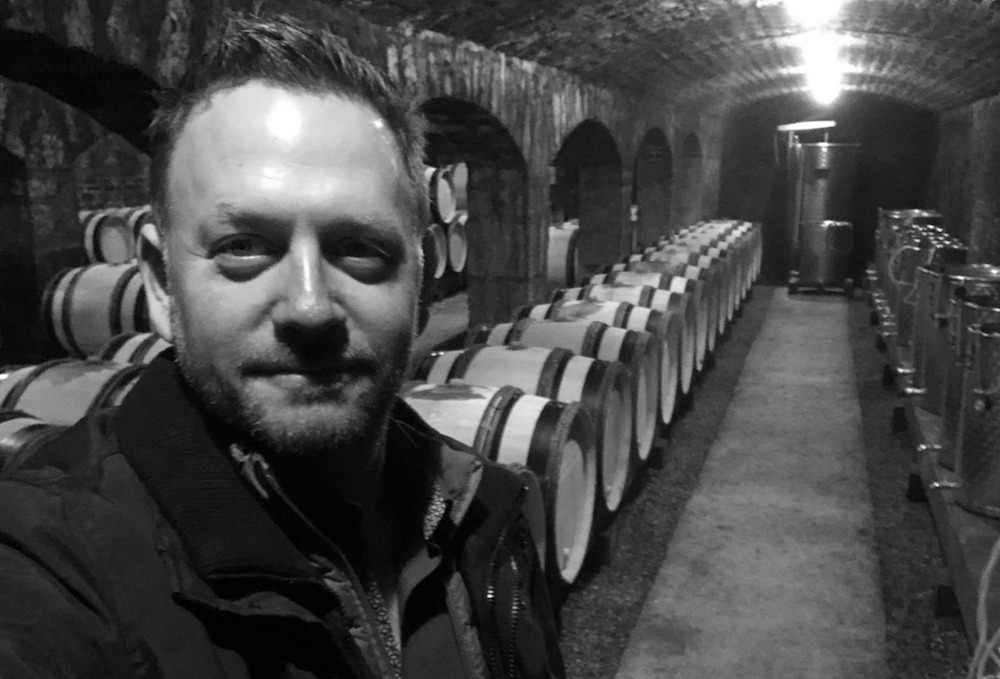
Old Bastard (Le) Sommelier, Bernard Stramwasser, feeling at home in Domaine Leroy’s cellar in Vosne-Romanée.
GFR: How many wines do you taste in a week these days?
BS: 5-10 wines
GFR: What’s your “house” wine at home?
BS: I seldom have the same wine open. I prefer diversity over consistency.
GFR: Most remembered glass of wine ever?
BS: 1937 Chateau Gillette Crème de Tête Sauternes. It was really enjoyable at the time, and then I found out after it had 24x the legal limit of lead. Good thing we just had a little.
GFR: What is your perfect glass (or bottle) of wine at the end of a crazy day at work?
BS: Mineral-driven, bright, saline white.
GFR: What advice would you give to these young bucks? What sage wisdom can an old hand like yourself pass on to the younger generation of Sommeliers?
BS: The more you know about wine, the more you realize you don’t know. Remain humble, always.
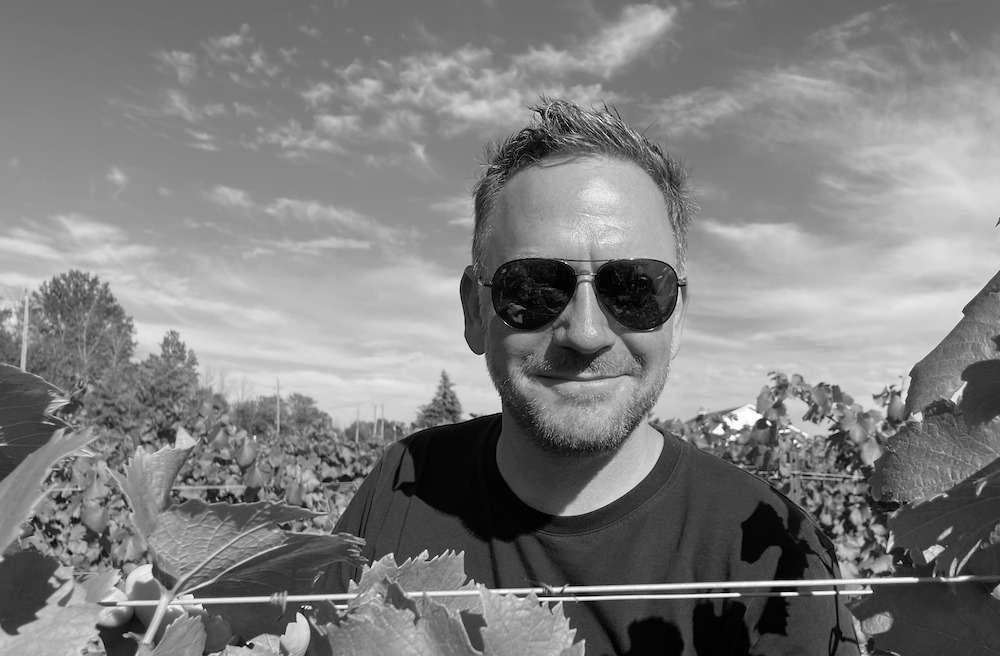
Old Bastard Sommelier, Bernard Stramwasser of Le Sommelier.
GFR: If you could go back and have a word with the young Bernard Stramwasser as he started in the business, what specifically would you tell him?
BS: I would have saved a bunch of years off my life if I had spoken to even ONE person about how to import wine into Ontario.
GFR: Coffee or tea?
BS: Coffee
GFR: Lemon, horseradish, mignonette, or hot sauce?
BS: Lemon
GFR: Vindaloo or Korma?
BS: Korma
GFR: Milk or dark?
BS: Dark
GFR: Ketchup, mayonnaise, or salt & vinegar?
BS: Mayonnaise!
GFR: Blue, R, MR, M, MW, W, Charcoal?
BS: MR
GFR: And now the cheesy question Bernard… If you were a grape varietal which would you be? and why?
BS: Cabernard Franc. Obviously.
GFR: Thank you for taking the time Bernard. Much appreciated.



